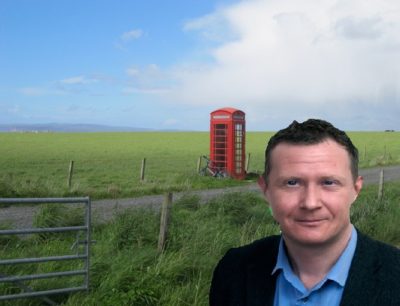
Sedgemoor Labour Councillor Wes Hinckes is a man of action as well as words. Recently he’s been taking the mop and bucket into his own hands and personally cleaning up the town. Well, it’s signposts at least. This week Wes has launched himself into a new campaign: To save Sedgemoor’s phone boxes which are threatened by cuts from Telecom giant BT.
Wes takes up the story himself
I’ve just had the opportunity to visit Sedgemoor FM and chat to Jackie Seeley about the possible removal of public phone boxes from Sedgemoor.
In case you aren’t aware BT have begun a consultation that seeks to remove 41 phone boxes throughout the district and this includes 16 red heritage phone boxes, a heritage icon that is a British favourite and instantly recognisable around the globe as a part Great Britain’s identity.
There is a map of the endangered phones on this webpage –
 These phone boxes are a public good, brought with public money, in principle they belong to us.
These phone boxes are a public good, brought with public money, in principle they belong to us.
We should defend what is ours.
These are public assets let’s not forget. British Telecom, its infrastructure and its network of phone boxes was taken from the people and privatised in 1984. Since then the public phone network has been decimated.
British Telecom’s excuse for this most recent cull is that many of the public phone boxes are no longer profitable, yet this is a company that last year made profits of £3.03 billion. There really is no need for such devastating action.
Times have changed over the years, there’s no denying it, but we must be mindful of the very real need and contribution of the public phone in our modern times.
There are many important reasons to hold on to this vital public service.
Why save a payphone?
Do you remember when a call to a company would take a few minutes of your time?
How things have changed.
We all know what it’s like to call a company helpline and be left waiting for over 30 minutes, passed on from department to department until finally we speak to someone who can help.
Depending upon the number you’re calling a phone box will cost you 60p for 15 minutes – dialling the same number from home could cost up to 88p and using a pay-as-you-go mobile £1.55.
A not uncommon 60 minute phone call to your bank and you could be saving yourself over £7, that’s more than the hourly minimum wage of £6.70!
They help the vulnerable!
 We know that vulnerable people make high use of public payphones.
We know that vulnerable people make high use of public payphones.
Almost one third of the Freephone calls can be to helplines and domestic violence services. These are people in desperate need of help. A pay phone for them becomes not only a place of sanctuary but also safety.
Our countries increasing homeless use payphones to call Freephone numbers when arranging a bed for the night in a hostel. In a city it can take a homeless person 4 to 6 hours on the phone to access a bed!
Personal Emergencies!
We don’t know when emergencies will happen, but we know that they will happen.
Car breakdowns and medical problem can happen anywhere at any time. If your mobile phone isn’t working you’re in serious trouble and it could be life-threatening.
Public phones also offer benefits that are critical to emergency service delivery such as a known location. Emergency services know immediately where your phone box is when you call!
You can’t always guide emergency services to where you are with your mobile and in an emergency you need help right away.
Disasters, like the Somerset Floods will happen again!
 We forget that our cell phone service can easily become overwhelmed and even rendered inoperable by a serious incident. Thousands of people calling their loved ones can cause the system to fail when we need it most. Pylons and cell masts can be blown out of action in severe weather and repairs can take weeks.
We forget that our cell phone service can easily become overwhelmed and even rendered inoperable by a serious incident. Thousands of people calling their loved ones can cause the system to fail when we need it most. Pylons and cell masts can be blown out of action in severe weather and repairs can take weeks.
Recent disasters in America have proved that the cell phone network is not reliable in these situations and that the public phone network saves lives.
They should be an important part of any resilient disaster plan and really can mean the difference between life and death.
Our nation’s protectors!

Our phone boxes may not be profitable for BT but they are standing guard for us every day, ready to help us when we most need them.
We should respect them and defend every single one.
Our country and our communities need them.
Please get in touch and save your local phone box
For a map of the endangered phones and details of how to have your say, please visit – https://medium.com/@weshinckes/save-our-heritage-c7eb78b49ca

